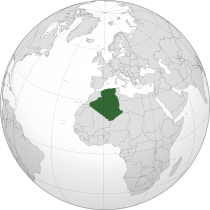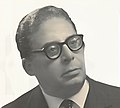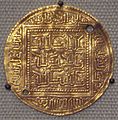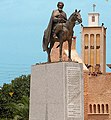This is an old revision of this page, as edited by ShakespeareFan00 (talk | contribs) at 09:00, 13 November 2024. The present address (URL) is a permanent link to this revision, which may differ significantly from the current revision.
Revision as of 09:00, 13 November 2024 by ShakespeareFan00 (talk | contribs)(diff) ← Previous revision | Latest revision (diff) | Newer revision → (diff)Portal maintenance status: (November 2021)
|

The Algeria Portal
Algeria, officially the People's Democratic Republic of Algeria, is a country in the Maghreb region of North Africa. It is bordered to the northeast by Tunisia; to the east by Libya; to the southeast by Niger; to the southwest by Mali, Mauritania, and Western Sahara; to the west by Morocco; and to the north by the Mediterranean Sea. The capital and largest city is Algiers, located in the far north on the Mediterranean coast. Spanning 2,381,741 square kilometres (919,595 sq mi), Algeria is the world's tenth-largest nation by area, and the largest nation in Africa. It has a semi-arid climate, with the Sahara desert dominating most of the territory except for its fertile and mountainous north, where most of the population is concentrated. With a population of 44 million, Algeria is the tenth-most populous country in Africa, and the 33rd-most populous country in the world. Algeria's official languages are Arabic and Tamazight; French is used in media, education, and certain administrative matters, but it has no official status. The vast majority of the population speak the Algerian dialect of Arabic. Most Algerians are Arabs, with Berbers forming a sizeable minority. Sunni Islam is the official religion and practised by 99 percent of the population. (Full article...) Refresh with new selections below (purge)Selected article - show another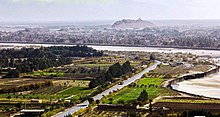 Laghouat (Arabic: الأغواط, romanized: al-Aghwāt) is the capital of the Laghouat Province, Algeria, 400 km (250 mi) south of the Algerian capital Algiers. Located in the Amour Range of the Saharan Atlas, the town is an oasis on the north edge of the Sahara Desert. It is an important administrative and military center and marketplace, and is known for rug and tapestry weaving. Laghouat traces its history to at least the 11th century. It was ruled by the Ottoman Turks in 1786 and annexed to Beylik of Titteri (Médéa). The town experienced the brutal Siege of Laghouat in 1852, and came under French colonial rule until 1962. (Full article...) General images - load new batchThe following are images from various Algeria-related articles on Misplaced Pages.
Did you know
Selected biography - show another Ahmed Ben Bella (Arabic: أحمد بن بلّة Aḥmad bin Billah; 25 December 1916 – 11 April 2012) was an Algerian politician, soldier and socialist revolutionary who served as the head of government of Algeria from 27 September 1962 to 15 September 1963 and then the first president of Algeria from 15 September 1963 to 19 June 1965. Ben Bella played an important role during the Algerian war of independence against France, leading the FLN, organizing the shipment of foreign weapons and coordinating political strategy from Cairo. Despite not being present in Algeria, French authorities tried to assassinate him multiple times. Once Algeria gained independence in 1962, Ben Bella's Oujda Group seized power from Benyoucef Benkhedda's provisional government after a short crisis, and Ben Bella became prime minister of Algeria with Ferhat Abbas as acting president. Ben Bella succeeded Ferhat Abbas on 15 September 1963 after rapidly sidelining him, and was elected president after winning an election with 99.6 per cent of the votes. (Full article...)
Selected cuisines, dishes and foods - show another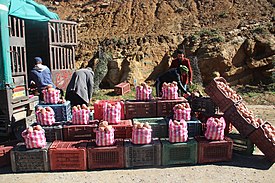 The cultivation of potatoes is a major part of the agricultural industry of Algeria. The country was the 17th-largest producer of potatoes in the world in 2018. Production is centred on two regions: the Mediterranean coast and the desert around El Oued. Growing conditions in the coast are broadly conventional in earth furrows while at El Oued centre pivot irrigation predominates, with the potatoes grown in sand. Only an insignificant minority of the crop is factory-processed. (Full article...)
Related portalsReligions in Algeria Arab states
Other countries WikiProjects {{{content}}}
CategoriesSelect to view subcategories Algeria Algeria-related lists Culture of Algeria Economy of Algeria Education in Algeria Environment of Algeria Geography of Algeria Government of Algeria Health in Algeria History of Algeria Organisations based in Algeria Algerian people Politics of Algeria Society of Algeria Algeria stubs EditThings you can do
New articlesThis list was generated from these rules. Questions and feedback are always welcome! The search is being run daily with the most recent ~14 days of results. Note: Some articles may not be relevant to this project. Rules | Match log | Results page (for watching) | Last updated: 2025-01-12 19:30 (UTC) Note: The list display can now be customized by each user. See List display personalization for details.
Algeria topics
Associated WikimediaFree media repository Collection of quotations Free knowledge base Free travel guide Dictionnaire Free-content library Free-content news
| ||||||||||||||||||||||||||||||||||||


